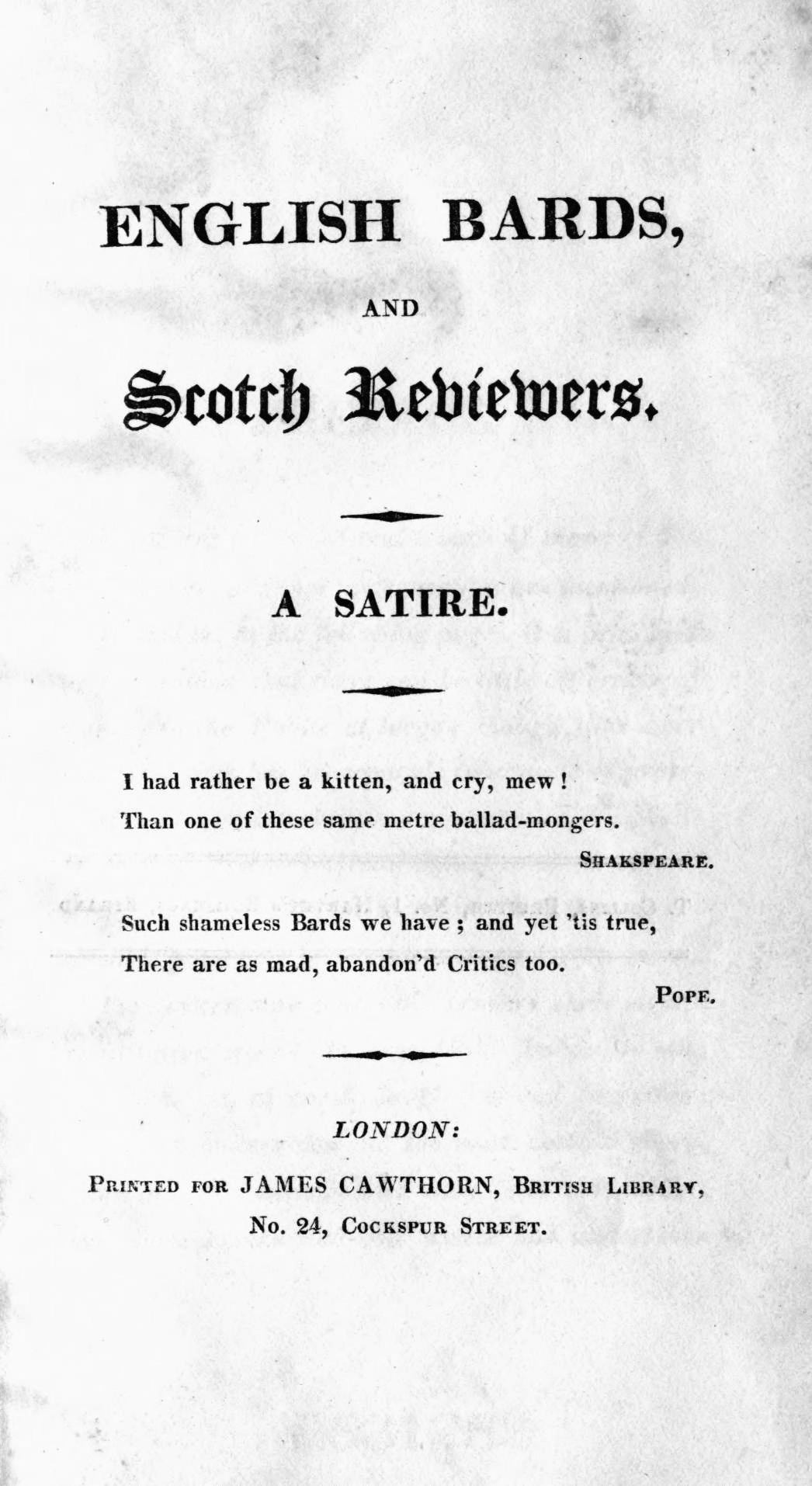English Bards and Scotch Reviewers on:
[Wikipedia]
[Google]
[Amazon]
 ''English Bards and Scotch Reviewers'' is an 1809 satirical poem written by
''English Bards and Scotch Reviewers'' is an 1809 satirical poem written by
 ''English Bards and Scotch Reviewers'' is an 1809 satirical poem written by
''English Bards and Scotch Reviewers'' is an 1809 satirical poem written by Lord Byron
George Gordon Byron, 6th Baron Byron (22 January 1788 – 19 April 1824), known simply as Lord Byron, was an English romantic poet and peer. He was one of the leading figures of the Romantic movement, and has been regarded as among the ...
, and published by James Cawthorn in London.
Background and description
The poem was first published anonymously, in March 1809, and a second, expanded edition followed in 1809, with Byron identified as the author. The opening parodies the first satire ofJuvenal
Decimus Junius Juvenalis (), known in English as Juvenal ( ), was a Roman poet active in the late first and early second century CE. He is the author of the collection of satirical poems known as the '' Satires''. The details of Juvenal's life ...
.
Byron had published his first book of poetry, '' Hours of Idleness'', in 1807. It received "strong censure" in a review by Henry Brougham, published anonymously in the '' Edinburgh Review''.
Byron was already working on a poem called "British Bards", but the review, which he (incorrectly) attributed to Francis Jeffrey
Francis Jeffrey, Lord Jeffrey (23 October 1773 – 26 January 1850) was a Scottish judge and literary critic.
Life
He was born at 7 Charles Street near Potterow in south Edinburgh, the son of George Jeffrey, a clerk in the Court of Session ...
, prompted him to expand its scope; he made Jeffrey "made the central figure in a wide-ranging satire on contemporary practices both in writing and in reviewing". In writing it, he drew on earlier satires, including the ''Baviad'' (1791) and ''Maeviad'' (1795) by William Gifford
William Gifford (April 1756 – 31 December 1826) was an English critic, editor and poet, famous as a satirist and controversialist.
Life
Gifford was born in Ashburton, Devon, to Edward Gifford and Elizabeth Cain. His father, a glazier and ...
(1791), the texts published in the '' Anti-Jacobin'' (1797-1798), the ''Epics of the Ton'' (1807) by Lady Anne Hamilton and the ''Simpliciad'' (1808) by Richard Mant
Richard Mant (12 February 1776 – 2 November 1848) was an English churchman who became a bishop in Ireland. He was a prolific writer, his major work being a ''History of the Church of Ireland''. s:Mant, Richard (DNB00)
Life
He was born at ...
.
Byron used heroic couplets in imitation of Alexander Pope
Alexander Pope (21 May 1688 O.S. – 30 May 1744) was an English poet, translator, and satirist of the Enlightenment era who is considered one of the most prominent English poets of the early 18th century. An exponent of Augustan literature, ...
's ''The Dunciad
''The Dunciad'' is a landmark, mock-heroic, narrative poem by Alexander Pope published in three different versions at different times from 1728 to 1743. The poem celebrates a goddess Dulness and the progress of her chosen agents as they bri ...
'' to attack the reigning poets of Romanticism, including William Wordsworth
William Wordsworth (7 April 177023 April 1850) was an English Romantic poet who, with Samuel Taylor Coleridge, helped to launch the Romantic Age in English literature with their joint publication '' Lyrical Ballads'' (1798).
Wordsworth's ' ...
and Samuel Taylor Coleridge
Samuel Taylor Coleridge (; 21 October 177225 July 1834) was an English poet, literary critic, philosopher, and theologian who, with his friend William Wordsworth, was a founder of the Romantic Movement in England and a member of the Lake ...
, and Francis Jeffrey, the editor of the ''Edinburgh Review''. He praised instead such Neoclassical poets as Pope and John Dryden
''
John Dryden (; – ) was an English poet, literary critic, translator, and playwright who in 1668 was appointed England's first Poet Laureate.
He is seen as dominating the literary life of Restoration England to such a point that the per ...
. The poem went through several editions, but Byron finally suppressed the 5th edition in 1812 because he had come to regret his attitude toward those he had attacked.
The text is referred to in Tom Stoppard
Sir Tom Stoppard (born , 3 July 1937) is a Czech born British playwright and screenwriter. He has written for film, radio, stage, and television, finding prominence with plays. His work covers the themes of human rights, censorship, and politi ...
's play '' Arcadia''. It is also referenced in John Edward Williams' novel '' Stoner'', in which it is mistaken by an incompetent graduate student as John Keats' work.
Sources
* Garrett, Martin: ''George Gordon, Lord Byron''. (British Library Writers' Lives). London: British Library, 2000. . * Garrett, Martin. ''Palgrave Literary Dictionary of Byron''. Palgrave, 2010. . * Grosskurth, Phyllis: ''Byron: The Flawed Angel''. Hodder, 1997. .References
External links
* '' English Bards, and Scotch Reviewers'' on Wikisource. * {{Byron Satirical books Poetry by Lord Byron 1809 poems 1800s poems 1809 works